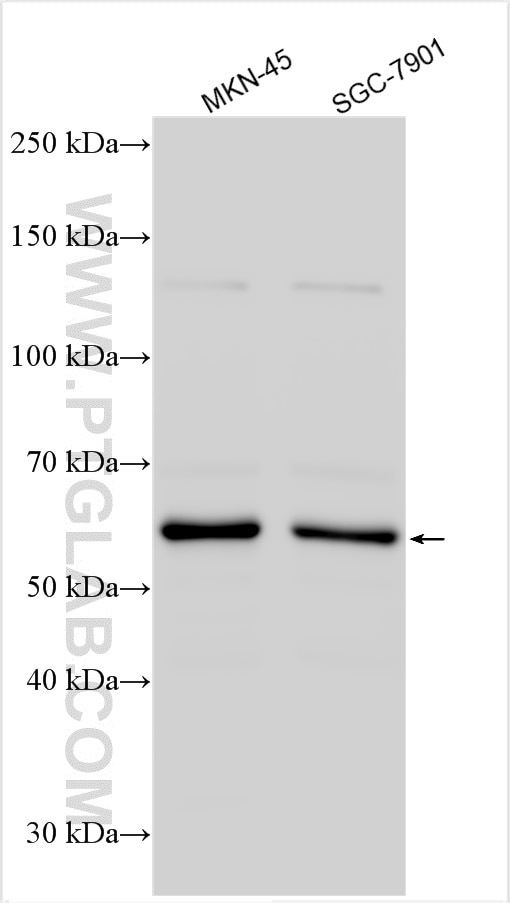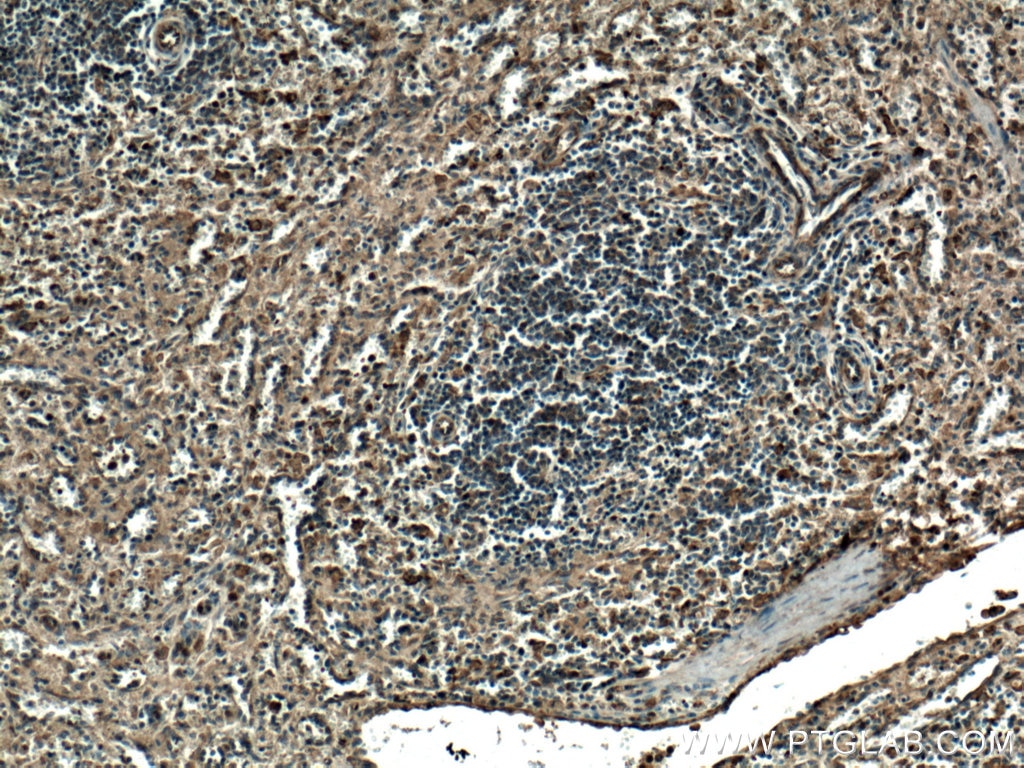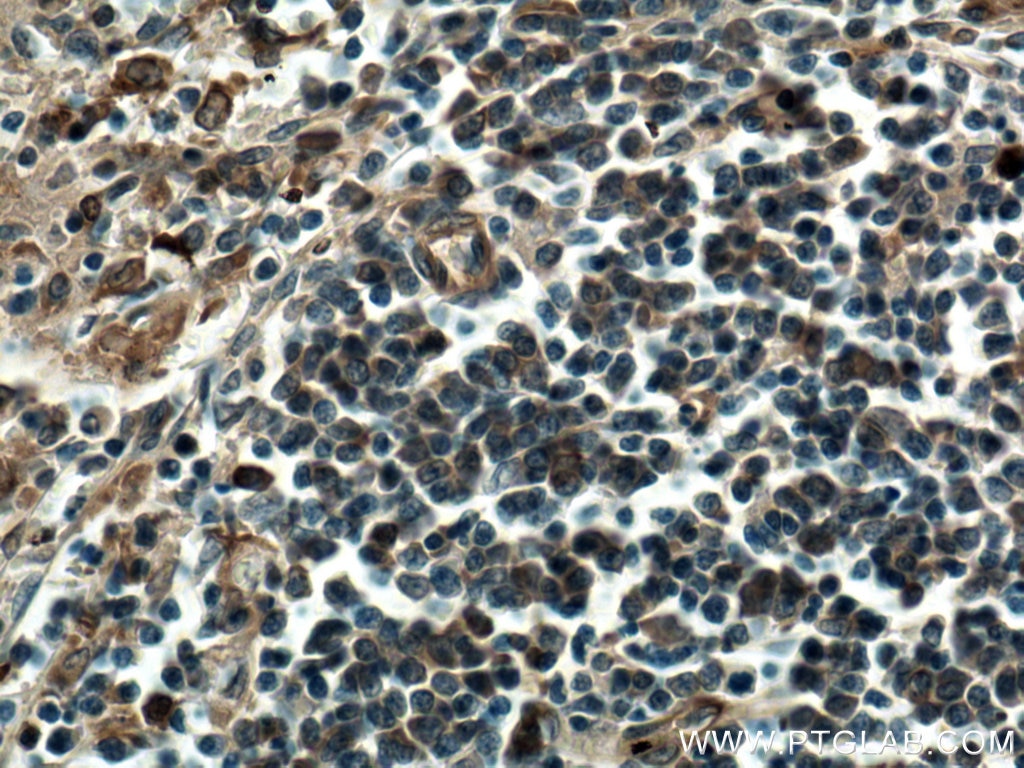- Featured Product
- KD/KO Validated
IFIT3 Polyklonaler Antikörper
IFIT3 Polyklonal Antikörper für WB, IHC, ELISA
Wirt / Isotyp
Kaninchen / IgG
Getestete Reaktivität
human und mehr (3)
Anwendung
WB, IHC, IF, CoIP, ChIP, ELISA
Konjugation
Unkonjugiert
Kat-Nr. : 15201-1-AP
Synonyme
Geprüfte Anwendungen
| Erfolgreiche Detektion in WB | MKN-45-Zellen, SGC-7901-Zellen |
| Erfolgreiche Detektion in IHC | humanes Milzgewebe Hinweis: Antigendemaskierung mit TE-Puffer pH 9,0 empfohlen. (*) Wahlweise kann die Antigendemaskierung auch mit Citratpuffer pH 6,0 erfolgen. |
Empfohlene Verdünnung
| Anwendung | Verdünnung |
|---|---|
| Western Blot (WB) | WB : 1:2000-1:12000 |
| Immunhistochemie (IHC) | IHC : 1:50-1:500 |
| It is recommended that this reagent should be titrated in each testing system to obtain optimal results. | |
| Sample-dependent, check data in validation data gallery | |
Veröffentlichte Anwendungen
| KD/KO | See 3 publications below |
| WB | See 38 publications below |
| IHC | See 4 publications below |
| IF | See 9 publications below |
| CoIP | See 1 publications below |
| ChIP | See 1 publications below |
Produktinformation
15201-1-AP bindet in WB, IHC, IF, CoIP, ChIP, ELISA IFIT3 und zeigt Reaktivität mit human
| Getestete Reaktivität | human |
| In Publikationen genannte Reaktivität | human, Affe, Hausschwein, Maus |
| Wirt / Isotyp | Kaninchen / IgG |
| Klonalität | Polyklonal |
| Typ | Antikörper |
| Immunogen | IFIT3 fusion protein Ag7349 |
| Vollständiger Name | IFIT3 |
| Berechnetes Molekulargewicht | 56 kDa |
| Beobachtetes Molekulargewicht | 60 kDa |
| GenBank-Zugangsnummer | BC004977 |
| Gene symbol | IFIT3 |
| Gene ID (NCBI) | 3437 |
| Konjugation | Unkonjugiert |
| Form | Liquid |
| Reinigungsmethode | Antigen-Affinitätsreinigung |
| Lagerungspuffer | PBS with 0.02% sodium azide and 50% glycerol |
| Lagerungsbedingungen | Bei -20°C lagern. Nach dem Versand ein Jahr lang stabil Aliquotieren ist bei -20oC Lagerung nicht notwendig. 20ul Größen enthalten 0,1% BSA. |
Hintergrundinformationen
IFIT3 (IFN-induced protein with tetratricopeptide repeats 3), also known as IFIT-4, ISG-60 or RIG-G, is a 56 kDa IFN induced protein. IFIT3 has been identified to be associated with strong IFN antiviral activity. Upon RNA virus infection, IFIT3 is significantly induced, ectopic expression or knockdown of IFIT3 could, respectively, enhance or impair IFN regulatory factor 3 (IRF3)-mediated gene expression. IFIT3 thus may serve as an important modulator in innate immunity, revealing a new function of the IFIT family proteins.
Protokolle
| PRODUKTSPEZIFISCHE PROTOKOLLE | |
|---|---|
| WB protocol for IFIT3 antibody 15201-1-AP | Protokoll herunterladen |
| IHC protocol for IFIT3 antibody 15201-1-AP | Protokoll herunterladenl |
| STANDARD-PROTOKOLLE | |
|---|---|
| Klicken Sie hier, um unsere Standardprotokolle anzuzeigen |
Publikationen
| Species | Application | Title |
|---|---|---|
Signal Transduct Target Ther TRAF3 activates STING-mediated suppression of EV-A71 and target of viral evasion | ||
Adv Sci (Weinh) Single-Cell Transcriptomic Analysis of Primary and Metastatic Tumor Ecosystems in Esophageal Squamous Cell Carcinoma | ||
Cancer Lett Induction of IFIT1/IFIT3 and inhibition of Bcl-2 orchestrate the treatment of myeloma and leukemia via pyroptosis
| ||
PLoS Pathog MAVS-MKK7-JNK2 Defines a Novel Apoptotic Signaling Pathway during Viral Infection. | ||
Front Immunol ISG15/USP18/STAT2 is a molecular hub regulating IFN I-mediated control of Dengue and Zika virus replication | ||
J Neuroinflammation Progression of pathology in PINK1-deficient mouse brain from splicing via ubiquitination, ER stress, and mitophagy changes to neuroinflammation. |




